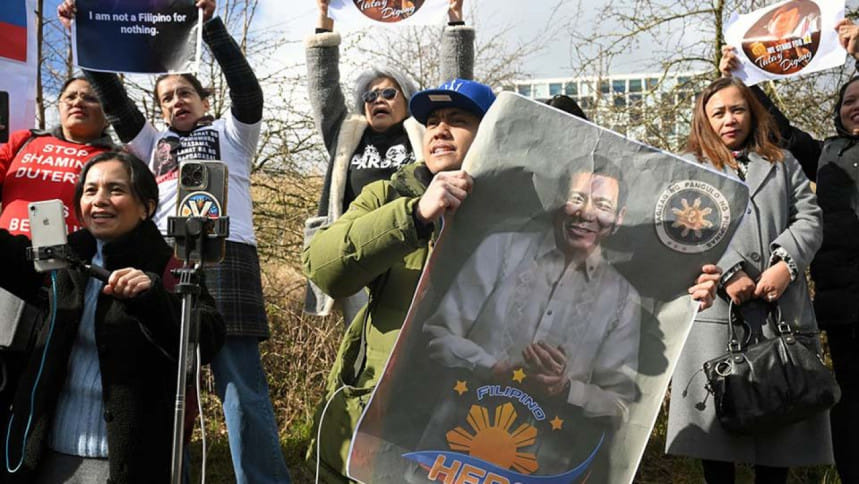‘Work from Hague’? Detained ex-Filipino leader Rodrigo Duterte wins mayor’s race, but can he govern?

Mr Rodrigo Duterte, the Philippines' former strongman president, has just pulled off a political comeback for the history books. He won the mayoral race on May 12 in his southern stronghold of Davao City while locked up some 11,000km away in The Hague, where he is on trial for crimes against humanity.
It was a landslide victory for Mr Duterte, who garnered over 662,000 votes against the 80,000 for his rival Karlo Nograles, who once served in his Cabinet.
Mr Duterte, 80, is being detained by the International Criminal Court (ICC) over his bloody war on drugs that left thousands dead. He was Davao's mayor for two decades before he became president from 2016 to 2022.
His children also swept local races: Sons Sebastian and Paolo won as city vice-mayor and House lawmaker for Davao's first district, respectively, while grandson Omar won as second district representative. Mr Paolo Duterte's other son Rigo secured a city council seat.
The patriarch's political heir is Philippine Vice-President Sara Duterte, but she faces an impeachment trial in a move plotted by allies of President Ferdinand Marcos Jr.
The midterm polls carried broader implications for the simmering Marcos-Duterte feud, with the partial, unofficial count so far indicating the breakthrough victories of the Vice-President's allies and independent opposition candidates in the Senate race.
Analysts called the outcome of the senatorial election a protest vote against the Marcos administration.
But Mr Duterte's win raises a pressing question: Can a mayor govern from a foreign jail cell, with the possibility of facing charges in a court the Philippine government no longer recognises after the country withdrew from the ICC in 2019?
Under the nation's election code, a candidate behind bars for alleged crimes can be proclaimed winner in the polls. This happened in the case of rebel soldier Antonio Trillanes IV, who ran and won a Senate seat in the 2007 election while detained at the country's military headquarters. But he was barred from performing his legislative duties and was only able to serve fully after getting amnesty in 2010.
Whether Mr Duterte can legally perform the functions of his office while under custody of an international court remains unclear.
That uncertainty has sparked a flurry of legal speculation and online jokes. "Tatay Digong is going to do WFH – Work from Hague," posted X user @vicotinamide, in reference to Mr Duterte's nickname.
One thing is clear for now: Vice-mayor-elect Sebastian Duterte will serve as acting mayor in his father's absence, under provisions of the local government code. But can Mr Duterte make his mayorship official?
He will have to take his oath. Vice-President Duterte, who is also a lawyer, told reporters on May 12 that her father must do so before June 30, the start of all elected officials' new term.
"We discussed it a few days ago and came up with three options about how he might be able to take the oath. According to his ICC lawyer, once they receive the proclamation documents, we'll revisit the discussion on how the former president can take his oath," Ms Duterte said.
The Duterte camp has already questioned the ICC's jurisdiction, arguing the Philippines had already withdrawn from the Rome Statute, the tribunal's founding treaty, in 2019. It is also planning to request his interim release.
Mr Duterte's lawyer earlier sought permission for him to vote on election day, only for the petition to be denied by the Philippine government, as he had not registered as an overseas absentee voter during the period from December 2022 to September 2024. He was arrested by the ICC on March 11, 2025.
Filipino constitutional lawyer John Molo, founding partner of the Manila-based Mosveldtt Law firm, told The Straits Times that if the election code is to be followed, Mr Duterte has six months from his proclamation day or until Nov 15 to take his oath.
But challenges remain. Winning candidates typically take their oath before a Filipino judge, notary or public official. With Mr Duterte in The Hague, Mr Molo raised questions about who will administer the oath, how they will get there, and who pays for the trip.
"That's The Hague, and that's a prison intentionally created to house high-profile individuals who committed crimes while in power," Mr Molo said. "Will the facility actually allow someone to come in to give this guy an oath so that he can take office again? I don't know."
He said Mr Duterte could miss the window for oath-taking if the ICC denies his interim release. It also typically takes the ICC years to resolve cases.
Constitutional lawyer Tony La Vina, former dean of the Ateneo School of Government in Manila, believes there is no way Mr Duterte can perform mayoral duties from detention.
"Because he's not in the Philippines. He will not be able to go to the office and sign documents. He cannot function as a city mayor," Mr La Vina told ST.
Now that the Commission on Elections has proclaimed Mr Duterte as Davao's mayor, both lawyers said it is up to the Department of the Interior and Local Government to determine whether his absence is temporary or permanent.
If it is temporary, Mr Sebastian Duterte will stay on as acting mayor until his father assumes office. If permanent, Mr Sebastian Duterte ascends as mayor, and the city council member with the highest number of votes becomes vice-mayor.
Legal experts note there is no precedent for a situation when a Filipino detained abroad by a court that the Philippines no longer recognises, wins in the elections. The challenge now falls on Mr Marcos to contain the resurgence of the Dutertes, known to be vindictive towards their enemies.

 For all latest news, follow The Daily Star's Google News channel.
For all latest news, follow The Daily Star's Google News channel. 



Comments